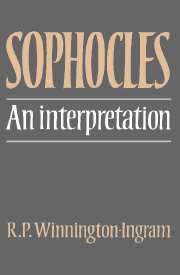Book contents
- Frontmatter
- Contents
- Preface
- Bibliography of short titles
- 1 Introductory
- 2 The mind of Ajax
- 3 The burial of Ajax
- 4 Trachiniae
- 5 Sophocles and the irrational: three odes in Antigone
- 6 Creon and Antigone
- 7 Fate in Sophocles
- 8 The fall of Oedipus
- 9 Furies in Sophocles
- 10 Electra
- 11 Oedipus at Colonus
- 12 Philoctetes
- 13 Heroes and gods
- Appendices
- Select index
7 - Fate in Sophocles
Published online by Cambridge University Press: 07 December 2009
- Frontmatter
- Contents
- Preface
- Bibliography of short titles
- 1 Introductory
- 2 The mind of Ajax
- 3 The burial of Ajax
- 4 Trachiniae
- 5 Sophocles and the irrational: three odes in Antigone
- 6 Creon and Antigone
- 7 Fate in Sophocles
- 8 The fall of Oedipus
- 9 Furies in Sophocles
- 10 Electra
- 11 Oedipus at Colonus
- 12 Philoctetes
- 13 Heroes and gods
- Appendices
- Select index
Summary
We shall all die, at a moment unknown and in circumstances no one can foresee: this is the ultimate dispensation. The Greeks, at some early stage in their thinking about the world, came to conceive of powers which they called Moirai. If these were spirits who presided over birth as well as determining death, it is not hard to see why. The individual comes to birth with an apportionment (a moira) of life, and nothing is more striking in the lot of human beings than the difference in their life-spans and the unpredictability of their deaths. There must be some power or powers which determine these things: not only birth and death but the events of life, particularly perhaps those which are dramatic and disastrous and lead towards death. The history of such beliefs and feelings is notoriously complex and debated. There is much evidence in Homer and Hesiod, but behind the poets a long tradition will have led back into the early history of the race and related races. When did cults of the Moirai originate? When did the singular moira acquire a degree of personification and approach the notion of a generalized power of destiny? These and many other questions are not very important for our study, since it is clear that the dramatists had inherited a whole cluster of conceptions which were available to their use, including the plural Moirai, a singular Moira with personification and an unpersonified moira (a fate). What they have in common is the suggestion of something inevitable, something that ‘has to be’, that is ‘bound to happen’.
- Type
- Chapter
- Information
- Sophocles: An Interpretation , pp. 150 - 178Publisher: Cambridge University PressPrint publication year: 1980
- 2
- Cited by



